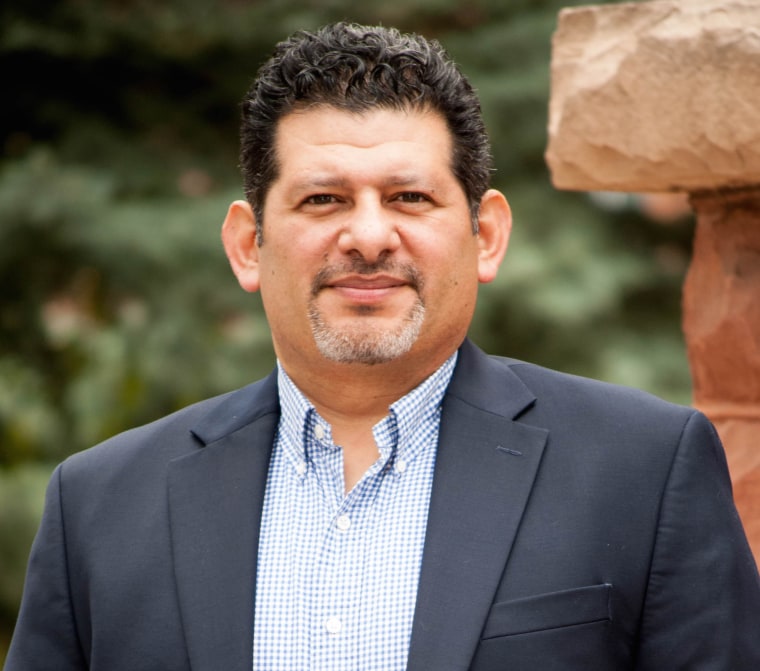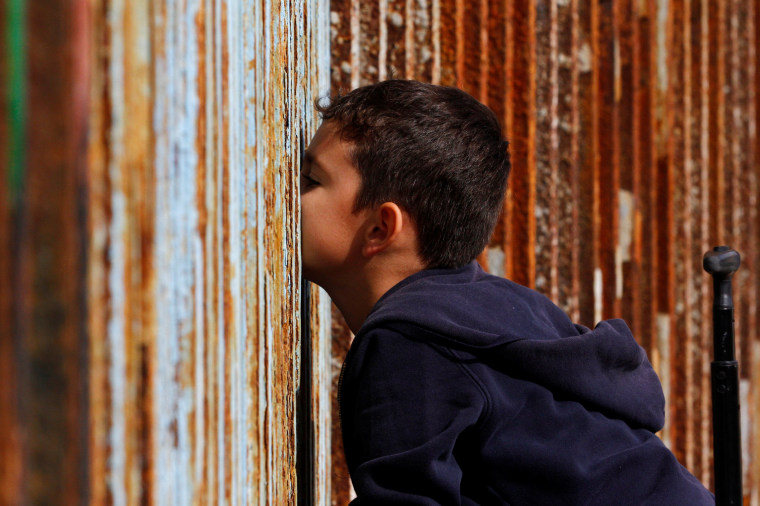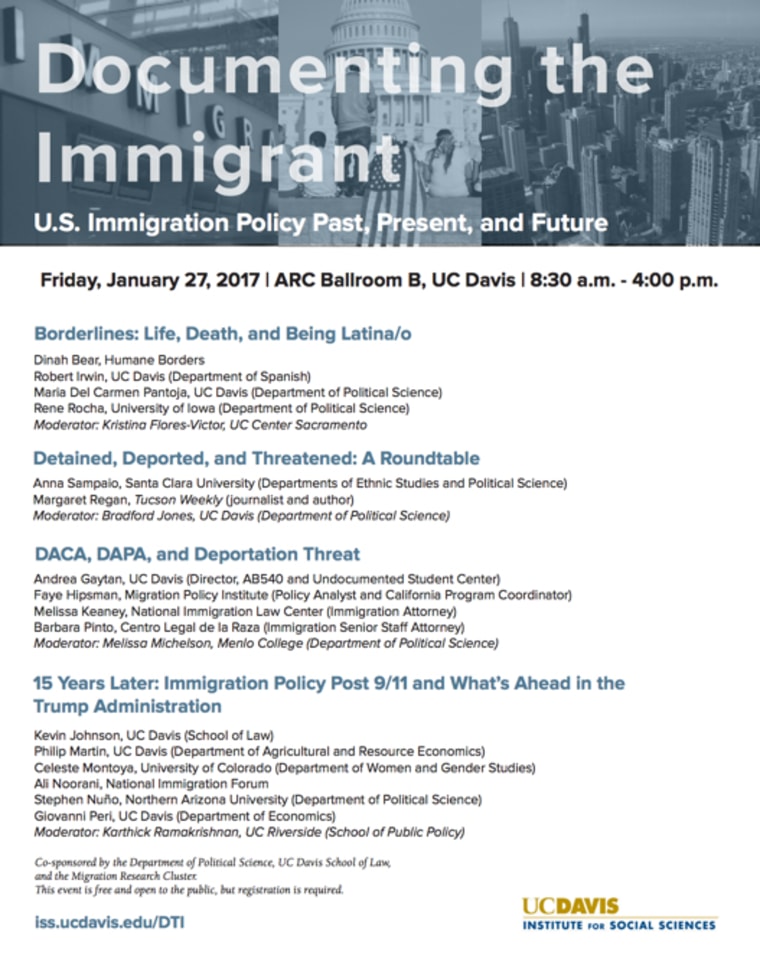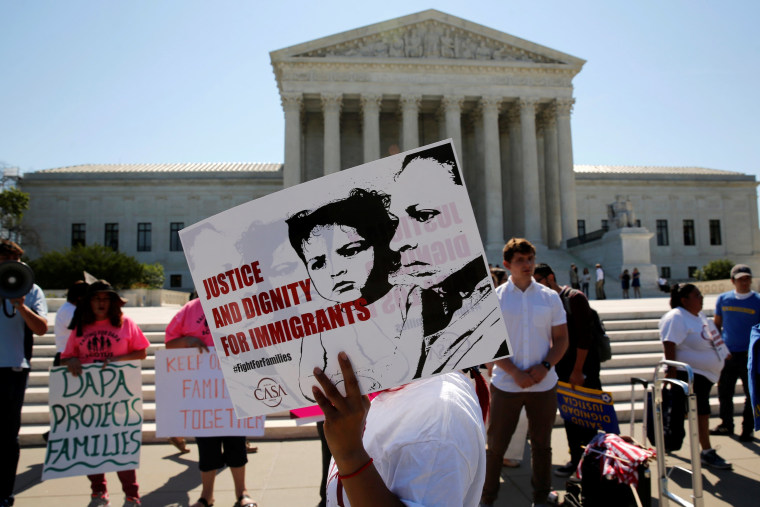
American Identity Struggle
The results of the presidential election brought about a level of uncertainty about immigration policy that will undoubtedly exacerbate the already high levels of anxiety among families with undocumented family members. With President Donald Trump already signing executive orders stoking the flames of angry sentiment against Muslims, Hispanics, and even women, which led to the president's rise in power, the substantive impact of his pen actions will have longstanding effects on the nation.
From theoretical frameworks of import to our country, such as the role that citizenship and legitimacy play in a democratic society which seems to be faced with it's most important challenges in at least a generation, to the practical realities faced by the immigrant community each day, scholars and practitioners are finding themselves caught off guard by this new political environment.
Not to suggest that all was well prior to this election. This country continues to struggle with the duality of an American identity that both reveres ingenuity in certain expressions, such as profit-making, but demands rigid adherence to the centrality of white masculinity as the cultural default.
One need only look at the president's Cabinet to illustrate how important is the politics of legitimacy. But to truly learn about American identity, we must resist the draw of looking at the powerful, and turn our gaze to those among us who are the least powerful. In this, immigrants are among this country's most precious resources. The Christians who voted for Trump, and they were amongst his most ardent supporters, would know this well, for it is in the Bible where Matthew writes, "Believe me, when you refused it to one of the least of my brethren here, you refused it to me."
Perhaps we scorn the immigrant not because of what s/he is, but because s/he reminds us of who we are. In this project we call nationhood and democracy, little can be more important than understanding who we are.
Stephen A. Nuño is an associate professor of political science at Northern Arizona University and a contributor to NBC News Latino.

Deporting the Undocumented
Mariana Rodriguez is a felon. Her crime? Working to support her family when her mother fell ill from cancer.
At 15, the undocumented Phoenix teen got a job at Subway, going to school by day and making sandwiches by night, to pay for the family’s rent and food. She kept up this grueling double shift for three years before she was arrested and charged with felony identity theft for using a fake name and Social Security number.
Will President Trump deport Mariana? Very likely. Earlier this week, his spokesman announced that the new president’s first immigration priority is to deport undocumented immigrants found guilty of crimes. Trump’s contends the U.S. is harboring up to 3 million such people; scholars insist that the number is closer to 1.9 million.
Whatever their numbers, not all are the “rapists” and violent criminals conjured up by Trump on the campaign trail. Many are people like Mariana, otherwise law-abiding workers whose only crime was using fake documents that allowed them to work and feed their families.

In fact, Arizona’s strict identity laws were crafted 10 years ago specifically to criminalize undocumented workers. Then-Gov. Janet Napolitano, later Secretary of Homeland Security, hoped that the harsh new felony designation would “discourage the further flow of illegal immigration.”
Mariana’s lawyer battled mightily, and unsuccessfully, to get her charges reduced to a misdemeanor, citing the family’s medical crisis and the glowing character references from her Subway bosses. After months in jail, held without bail, Mariana finally pleaded guilty to the felony and was sent to detention. ICE unexpectedly released her when her mother was hospitalized near death, but her case is on “administrative closure,” a legal limbo that provides no protection from future deportation. If Trump’s deportation squad comes calling, she may be out of legal options.
Margaret Regan is a journalist and author of the books Detained and Deported: Stories of Immigrant Families Under Fire and The Death of Josseline: Immigration Stories from the Arizona Borderlands.

The Immigrant Obsession
Donald Trump and the white nationalists who embraced him are obsessed with immigrants. To be clear, it’s not every immigrant or immigration policy that drives this group – it is Latina/o immigrants (specifically undocumented Mexican immigrants ) along with Muslim immigrants that are foundational to their obsession and their national identity. Over the past 18months, Trump waged a derisive campaign that traded on fears of Latinas/os and Muslim non-citizens - constructing them as threats to national security and economic prosperity – in an effort to unify a conservative base and mobilize white voters. Vilifying Latinas/os became a cornerstone of Trump’s “strategic racism” from his infamous announcement as presidential candidate depicting the population as “criminals and rapists” through the inauguration where promises to “build a border wall” were featured on the White house website moments after the oath of office was administered.
Latina/o and Muslim immigrants have been terrorized under this new regime while routinely subjected to depictions as terrorists.
This narrative would be bad enough if the law, policy, and administration of immigration were operating from a position of normalcy. Instead, immigration politics have been reorganized over the past 30 years into a highly restrictive regime where scrutiny of immigrant lives, limitations on admission, mobility, employment, and public services, and increased detention and deportations, have become common. Latina/o and Muslim immigrants have been terrorized under this new regime while routinely subjected to depictions as terrorists. The Trump administration promises to add to this deficit of decency by capitalizing on the racialization of Latinas/os and Muslims as foreign and threatening, by ending deportation relief and work opportunities for young immigrants, by expanding dragnet raids, detentions and deportation in pursuit of “criminal aliens,” by fortifying a border wall and by denying the most vulnerable refuge.
This process of racialization manifests in the construction of immigrants as threatening and in the appeals to white voters to reject any association (as neighbors, co-workers, colleagues and allies). Whites voters are encouraged to transfer their economic or political insecurities onto this alleged enemy, obscuring any larger analysis of the underlying mechanisms of globalization that have undermined both immigrants and the displaced working-class and middle-income whites that supported Trump. This racialization is accompanied by a performance of gender and masculinity - what I call the masculine nationalist– who engages in displays of overtly dominative bravado and harassment designed to secure male superiority, coupled with appeals to paternalist protection. In this way the new administration is both deeply racialized and gendered and actively building upon a long history of subordination to embolden a racist, sexist and homonormative national identity. I find debates about whether Trump voters were actually racist or sexist personally futile as they obscure the process by which racially subordinating agendas have been further institutionalized, where restrictive immigration politics have been extended and emboldened and where sexist performance of masculinity are normalized.
Anna Sampaio is an associate professor of ethnic studies and political science and director of Ethnic Studies at Santa Clara University and is the author of Terrorizing Latina/o Immigrants: Race, Gender, and Immigration Politics in the Age of Security.

Asserting the Hardline
The Trump administration did not tackle immigration on day one. However, it was not long before Trump signed his first set of executive orders cracking down on immigration. By paving the way for the construction of a border wall on the southern border, eliminating funding for sanctuary cities, and reinstating Secure Communities in an effort to ramp up deportations, the Trump administration sent a signal of its intent to make immigration policy a priority and asserted the hardline tone that was a staple of the Trump campaign.
With an expected ban on Syrian refugees and the fate of DACA still undetermined, future actions are worrying and outright grim to immigrant advocacy groups and individuals who will be directly affected and promising to immigration hardliners. Immigration policy under the Trump administration is still uncertain though its early actions in no way suggest a softening. It is early still and one will need to wait and see how far the Trump administration is willing to push immigration crackdowns and what pushback it will receive legally, politically, and publicly.


